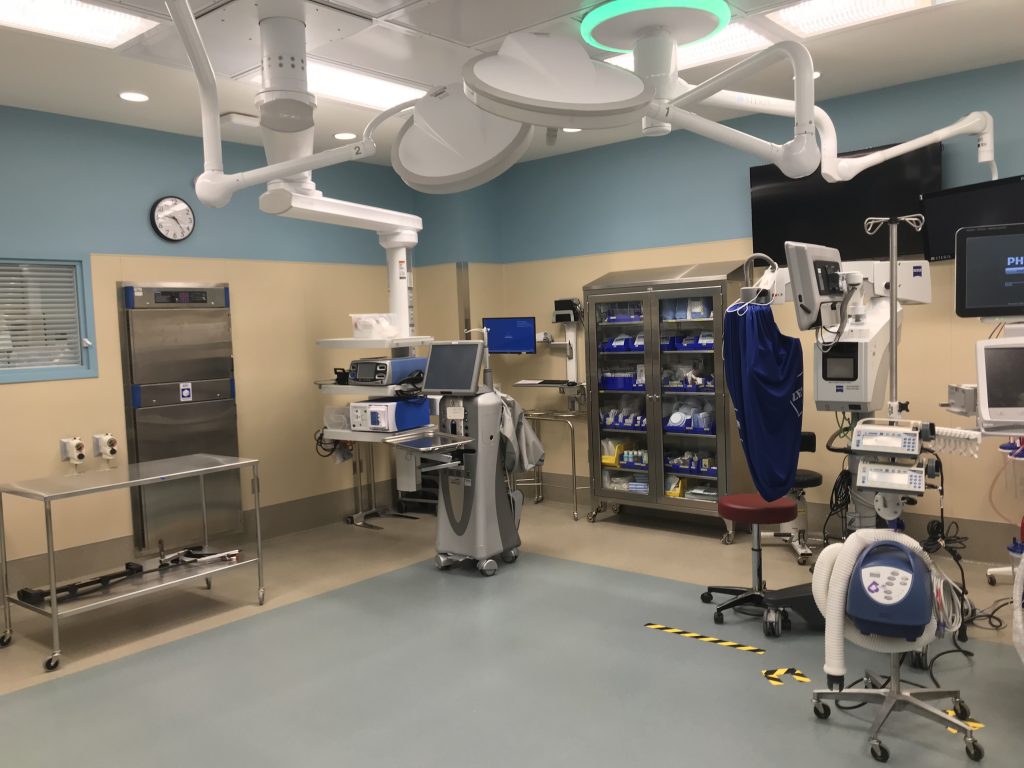Hey, friends! Here’s another “Quick tips” post in which I answer a few of the questions posed by listeners to a recent Healthy Matters radio broadcast. As is often the case, I can’t get to all the questions, but this week’s grab bag of topics is a good one.
Read on. Or if you are aurally inclined, you can listen to the podcast recording at your leisure by clicking the banner below. The questions here are taken directly from listeners from Healthy Matters show #480, March 25, 2018.
I’m going to scatter pictures of our newly-opened Clinic and Specialty Center, which is a state-of-the-art medical facility in downtown Minneapolis. Cool to see a new medical facility that still has that “new clinic” smell – ha!
Question 1:
“If you have had the original shingles shot should you still get the new one?”
Answer:
I truly didn’t know the answer to this question when it was posed on last week’s show. So I checked.
The answer is yes. If you had the earlier shingles vaccine (brand name is Zostavax), you can and should still get the newer vaccine (brand name is Shingrix). This is because the original vaccine was on average, just a bit better than 50% effective. Not bad for the time, but the new vaccine is over 90% effective. The new vaccine (which actually is a two shot deal) is recommended for people over age 50. It doesn’t matter if you had shingles or the previous shot. If you have had no shingles vaccine, go with the newer Shingrix.
Here’s more from the CDC about shingles.
From the Hennepin Healthcare Clinic and Specialty Center: here’s where you get a colonoscopy. There is no better facility in Minnesota – and the doctors and nurses are the best!
Question 2: Pneumonia shot
“If you get the expensive pneumonia shot, can you still get pneumonia? My good friend did, why?”
Answer:
Yupper, you can still get pneumonia, even if you received a pneumonia shot. The deal with all vaccines is that they reduce your risk of getting an illness. They also are likely to make the illness less severe if you do still get it.
I use the seat belt analogy. Seat belts can’t prevent car crashes, nor can they prevent all injuries if you are in a crash. If fact, people do indeed get injured while wearing seat belts. But it is well-established that seat belts reduce your risk of dying in a crash. Vaccines have a similar deal – you may still get sick or you may not, but you’re more likely to survive either way.
For adults age 65 or older, there are actually two pneumonia vaccines. You should get them both, but get them one-year apart. They are called Prevnar and Pneumovax. Here are the CDC guidelines for pneumonia vaccine. They are a bit wordy, so be sure to talk to your doctor if you are over 65 or are younger but have chronic health conditions (like COPD, asthma, heart disease, etc).
Check out the waiting areas in the new Clinic and Specialty Center. Warm, airy, lots of natural light . . .
Question 3: Blocked coronary arteries.
“My dad went to the hospital on March 12 with pressure in his chest. They found he has 100%, 90%, and 70% blocked arteries. They released him and now is waiting for VA approval that could take 30 days. Should he use his Medicare? The wait seems ridiculous.”
Answer:
My first reaction to this questions is, yes, the wait seems ridiculous. Of course, I don’t know the specifics of this case, and it is not automatically true that you need to act immediately on blocked arteries. That probably sounds crazy.
What this question describes is probably angina pectoris. This is chest pain caused by inadequate blood flow to the hard-working heart muscle. It is not a myocardial infarction (or heart attack) which means the heart muscle is dying by the minute. Although related conditions, heart attack is an emergency whereas angina is more of a chronic condition. They wouldn’t have sent the patient home with a heart attack (or I hope not!). These two conditions are both the result of atherosclerosis (narrowing) of the coronary arteries which supply the heart.
There are reasons we don’t always immediately do something about angina. Here are some possible reasons:
- The patient is too frail to do anything invasive like angiography.
- The blockages in the arteries are in a position that doing PCI (percutaneous coronary intervention) is not possible. That leaves bypass surgery as the only invasive option, and bypass surgery is not always good for all people – it may be too risky.
- Medications for angina are actually quite effective, so simply giving medications is often the best option anyway.
People are often surprised to hear that opening up blocked arteries with invasive procedures is not always – or even usually – better than treating with medications. But it is true – the medications work well.
All that being said, I do wonder about the person in this question and the need to wait that long. Angina by its very definition is a painful situation for which there are good treatments: bypass surgery, PCI (angiography with stenting), and medications. This person should be getting some of these treatments more quickly. And yes, Medicare should cover all of this (as should the VA).
For more on angina, please see my earlier post where I describe it in more detail.
Ever see an Operating Room? They thought of everything in the surgery department, really private, really modern. And I know the surgeons – they are awesome!
Question 4: Antibiotics before dental procedures
“I had rheumatic fever when I was young and have always taken antibiotics prior to dental procedures. I’m going to have dental work for getting dentures including extractions and they are telling me I don’t need any. Is this true?”
Answer:
Yup, it’s true. We now know that antibiotics are not needed to prevent infection prior to most procedures. For years doctors and dentists prescribed antibiotics before procedures in order to prevent serious infections – mainly blood, joint, and heart infections.
We have learned a great deal over the years, however, and the current recommendations for antibiotics are limited to a very specific subset of people. The vast majority of people who used to take antibiotics for dental work no longer need to do so. If fact, the risks are often worse than any benefit. This includes people with artificial joints and most people with previous heart problems, including most people who had rheumatic fever. Some groups, like those with artificial heart valves and those with very high-risk rheumatic fever (which isn’t most people) may still need antibiotics. So if the caller has artificial heart valves, he or she may still need antibiotics.
Here is the guideline from the American Dental Association on antibiotics. Of course, every person is unique, so ask your own doctor or dentist for your specific case.
Hennepin Healthcare is known for its rehabilitation care – whether it be traumatic brain injury, stroke care, or other trauma. (Click on TBI or stroke for more info). The new PT gym at Hennepin Healthcare is flooded in natural light, has state of the art equipment, and terrific therapists. This is a place of healing:
Question 5:
“I am doing labs for an annual check. They are ordering an HIV test. I’ve been married 30 years, why would I need to do an HIV test? They are telling me it’s new guidelines. Why?”
Answer:
It is true that the CDC recommends an HIV test at least once on all people age 13 to 64. For people at higher risk, an HIV test is recommended every year.
Why the heck is this? The reason may not be obvious but it is important. HIV is a treatable disease. But it can’t be treated if a person is unaware of the diagnosis. Further, our experience as doctors and health care systems has proven that we are pretty bad at identifying who is truly at risk for HIV. Married people get it. People get it from female partners and from male partners. It can come from accidental occupational hazards, from needle sticks, and so forth. We just are not good at identifying who really is at the most risk. The result is that we miss the diagnosis on far too many people. Missed diagnosis = lack of care = not good.
So the guideline removes the uncertainty. Now we simply get an HIV test on everybody – at least once in a lifetime. No stigma, no questions asked, just get the test on everybody. The cost is minimal for a huge payoff for society in the long run.
Here’s the CDC HIV-testing guideline.
That’s all!
Four things for you to do:
- Subscribe to MyHealthyMatters (this blog) by e-mail below.
- Listen to Healthy Matters live radio broadcast on WCCO.COM at 7:30 Central Time or on the AM radio at WCCO 8-3-0
- Follow me on Twitter @DrDavidHilden
- Learn more about the Hennepin Healthcare Clinic and Specialty Center.






